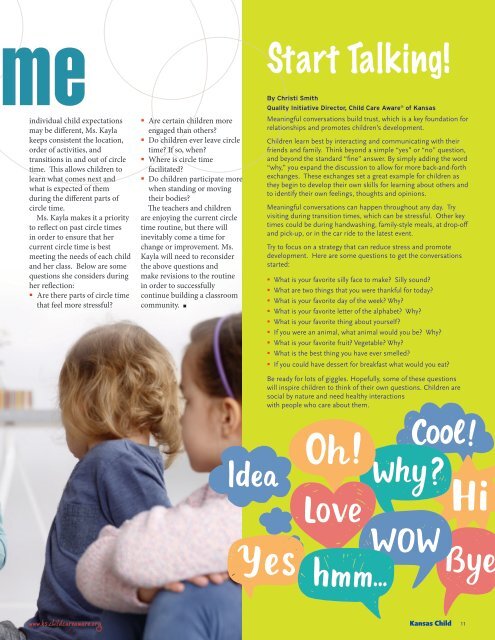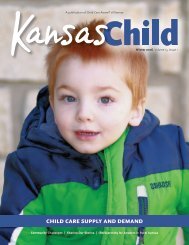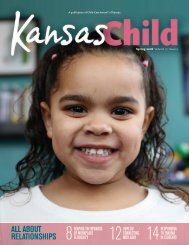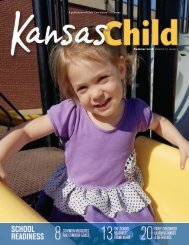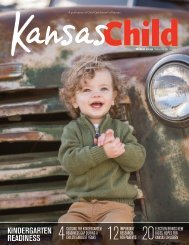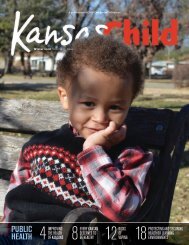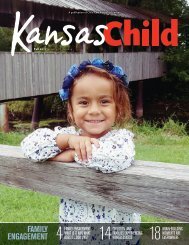2018 Spring Kansas Child
You also want an ePaper? Increase the reach of your titles
YUMPU automatically turns print PDFs into web optimized ePapers that Google loves.
me<br />
individual child expectations<br />
may be different, Ms. Kayla<br />
keeps consistent the location,<br />
order of activities, and<br />
transitions in and out of circle<br />
time. This allows children to<br />
learn what comes next and<br />
what is expected of them<br />
during the different parts of<br />
circle time.<br />
Ms. Kayla makes it a priority<br />
to reflect on past circle times<br />
in order to ensure that her<br />
current circle time is best<br />
meeting the needs of each child<br />
and her class. Below are some<br />
questions she considers during<br />
her reflection:<br />
•§<br />
Are there parts of circle time<br />
that feel more stressful?<br />
•§<br />
Are certain children more<br />
engaged than others?<br />
•§<br />
Do children ever leave circle<br />
time? If so, when?<br />
•§<br />
Where is circle time<br />
facilitated?<br />
•§<br />
Do children participate more<br />
when standing or moving<br />
their bodies?<br />
The teachers and children<br />
are enjoying the current circle<br />
time routine, but there will<br />
inevitably come a time for<br />
change or improvement. Ms.<br />
Kayla will need to reconsider<br />
the above questions and<br />
make revisions to the routine<br />
in order to successfully<br />
continue building a classroom<br />
community. n<br />
Start Talking!<br />
By Christi Smith<br />
Quality Initiative Director, <strong>Child</strong> Care Aware ® of <strong>Kansas</strong><br />
Meaningful conversations build trust, which is a key foundation for<br />
relationships and promotes children’s development.<br />
<strong>Child</strong>ren learn best by interacting and communicating with their<br />
friends and family. Think beyond a simple “yes” or “no” question,<br />
and beyond the standard “fine” answer. By simply adding the word<br />
“why,” you expand the discussion to allow for more back-and-forth<br />
exchanges. These exchanges set a great example for children as<br />
they begin to develop their own skills for learning about others and<br />
to identify their own feelings, thoughts and opinions.<br />
Meaningful conversations can happen throughout any day. Try<br />
visiting during transition times, which can be stressful. Other key<br />
times could be during handwashing, family-style meals, at drop-off<br />
and pick-up, or in the car ride to the latest event.<br />
Try to focus on a strategy that can reduce stress and promote<br />
development. Here are some questions to get the conversations<br />
started:<br />
•§<br />
What is your favorite silly face to make? Silly sound?<br />
•§<br />
What are two things that you were thankful for today?<br />
•§<br />
What is your favorite day of the week? Why?<br />
•§<br />
What is your favorite letter of the alphabet? Why?<br />
•§<br />
What is your favorite thing about yourself?<br />
•§<br />
If you were an animal, what animal would you be? Why?<br />
•§<br />
What is your favorite fruit? Vegetable? Why?<br />
•§<br />
What is the best thing you have ever smelled?<br />
•§<br />
If you could have dessert for breakfast what would you eat?<br />
Be ready for lots of giggles. Hopefully, some of these questions<br />
will inspire children to think of their own questions. <strong>Child</strong>ren are<br />
social by nature and need healthy interactions<br />
with people who care about them.<br />
www.ks.childcareaware.org <strong>Kansas</strong> <strong>Child</strong> 11


